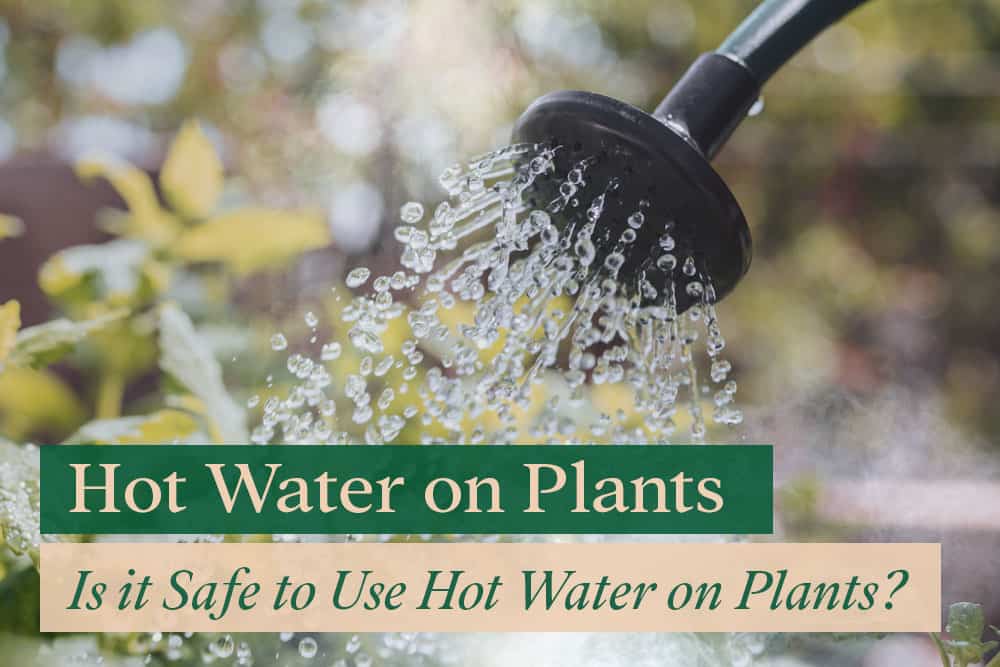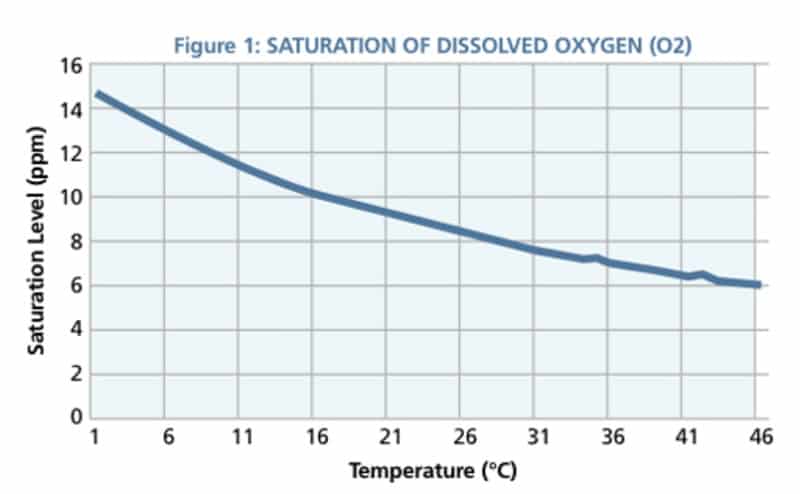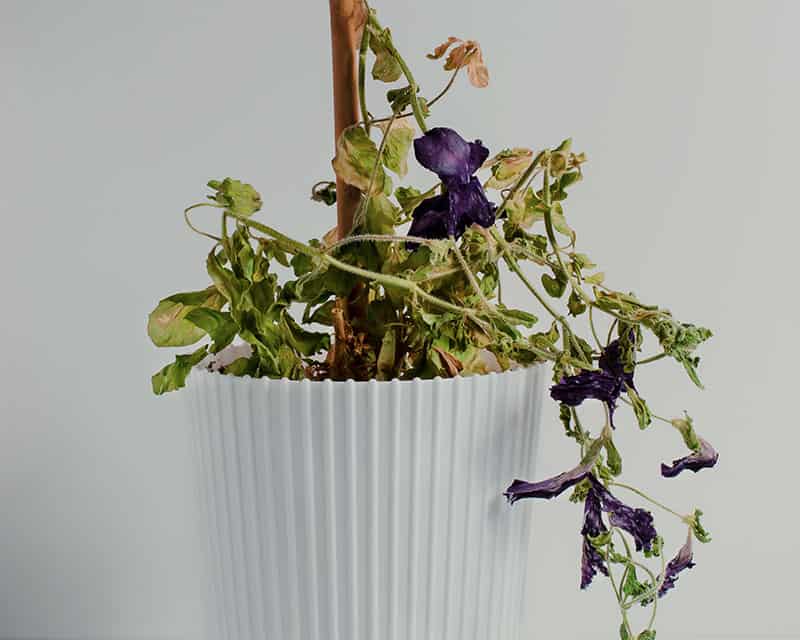
Have you heard of using hot water to help your plants grow faster? Is it even safe to use hot water on plants?
Hot water temperatures of up to 120°F (49°C) are generally safe for most plants. However, you can damage the cell structure and root system of a plant above that temperature. Cold water below 40°F (5°C) can also cause root shock and wilting.
In this post, I’ll go through the ideal water temperature for watering houseplants, as well as the benefits and drawbacks of using hot water for plants.
Let’s get started!
Best Water Temperature for Plants
Water temperature affects the amount of Dissolved Oxygen (DO) available in your plants’ water.
Dissolved Oxygen is required for optimum plant development, especially root formation, nutrient absorption, and photosynthesis.
Thus, a higher DO level is a good indicator of the quality of your plants’ water.

In general, the ideal water temperature for plants is between 68 and 78°F (20 and 26°C). The dissolved oxygen level is greater than 8 mg/l within these ranges, which is perfect for promoting healthy root development.
As the temperature rises above 122°F (50°C), the DO level falls below 4 mg/l, and the water becomes hypoxic and highly harmful to plants.
The benefit of High-Temperature Water on Plants
Although it’s not ideal, sometimes using hot water can be beneficial to plants. Hot water can help eradicate pests problems.
There are two techniques of using hot water to eradicate pest infestations: hot water bath and shower.
Hot Water Bath Technique – You can immerse your entire plant pot into a bucket of hot water at 120°F for 1 – 10 minutes. This method is effective in eliminating pests such as aphids, scale, mealybugs, and mites.
But keep in mind, the temperature of the root ball of your potted plants should not exceed 115°F, or else you might harm the plant.
Hot Shower Technique – Spray your potted plants with boiling water at 120°F for 5 minutes, then give them a 1-minute cold rinse to prevent heat damage. Repeat the process three times. This will help you effectively get rid of nymphs and crawlers.
Dangers of Using Boiling Water on Plants
Warm water is beneficial for plant development, but boiling water above 120°F can be more damaging to the plants than helpful.
Boiling water is harmful to plant structure and root system, and if the leaves are touched, it will melt their protective layer. On top of that, it can eradicate microorganisms in your potting mix needed for growth.
Damage plant structure
Plant cells need water to maintain their turgidity and form. However, watering your potted plants with boiling water will damage the cells entirely.
The cells will no longer be able to retain water and become flaccid.
Damage root system
As you know, the root system is the main foundation of plants. It provides nutrients essential for plant development and absorbs water from the soil.
Using boiling water to water your potted plants will scald the roots, making them lose their ability to absorb water and nutrients.
Killing microorganisms needed for growth
Beneficial microorganisms, such as rhizobia, mycorrhizal fungi, actinomycetes, and diazotrophic bacteria, are most likely present in your soil.
They are essential for producing nutrients and plant growth hormones and can fight off pests, parasites, and other diseases.
Using hot water above 120°F will kill these microorganisms, rendering your plants’ growth to a halt.
Damage leaves protective layers.
When using hot water, you should direct water at the root zone and make sure to avoid the leaves. Hot water can melt the cuticle of your leaves.
The cuticle is the outermost layer of leaves that protects plants against pathogens, pests, and environmental stress.
Without this protective layer, plants become more prone to diseases.
Signs Your Plants Could Not Tolerate Hot Water
Most plants will show signs of distress when exposed to over-boiling water, but it will depend on their individual tolerance.
Some plants are more sensitive than others. If your plant is droopy and wilted – just like it’s about to die – that’s the biggest indicator that you’re using water that is too hot for them.

Will Plants Recover from Hot Water?
The effects of hot water can be repaired if only a small section of the roots are damaged. As long as you water them with room-temperature water until the soil has cooled down, they should be able to recover in a couple of days.
However, if your plants have already received extensive root damage, there is little you can do for them.
Related Questions
Is it safe to use cold water for plants?
Using cold water below 68°F (20°C) may not kill your plants but can cause them to go dormant. They will stop growing new leaves or flowers.
However, using water temperature below 40°F (5°C) can induce root shock, resulting in long-term root harm, leaf droop, and even plant death.
Do I need to heat rainwater for plants?
Some people are concerned that contaminants are gathered while harvesting rainwater from the roof, but boiling rainwater is usually unnecessary.
However, you can install filter systems on the roof to reduce the amount of contaminants collected.
Also read: Storing Rainwater for Plants: How to Increase Its Shelf-Life
How Long Should You Boil Water For Plants?
Some gardeners boil water if they believe it may contain contaminants or impurities that are harmful to their plants.
Boiling water to 212°F for 1 minute will kill most contaminants, making the water safer for sensitive plants.
The water must cool to room temperature before using, or the heat will kill the plants.
Watering During a Hot Day
Some people emailed me asking whether it is safe to water on a hot day. The answer is, yes, you can water during a hot day – but it should be early in the morning or late in the evening when it’s still cool outside.
If you decide to water midday when it’s hot outside, the water will evaporate very quickly and leave your plant dry.
How to Cool Down Water In Your Garden Hose
I’m sure you’re familiar with how hot the water in your garden hose can get during summer or heatwave. It’s really hot!
Let the water run off the hose for a minute or two before using it to water your plants. This can help you lower the temperature to safe levels.

